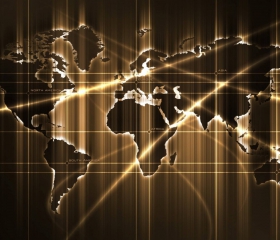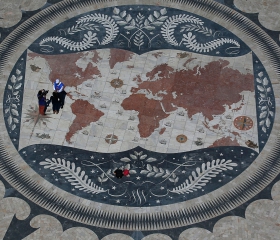After the Ukraine crisis and military intervention in Syria, the key principles and ideas underpinning Russian foreign policy are becoming easier to understand.
Ivan Timofeev, who participated in the annual meeting of Valdai International Discussion Club is giving a talk on the outline of future Russian foreign policy.
Ivan Timofeev, who participated in the annual meeting of Valdai International Discussion Club is giving a talk on the outline of future Russian foreign policy.
After the Ukraine crisis and military intervention in Syria, the key principles and ideas underpinning Russian foreign policy are becoming easier to understand.
Against the backdrop of the Ukraine crisis and the military airstrikes in Syria, Russian foreign policy is often seen as unpredictable. Not only was Russian action in both cases swift and unexpected, the scope of the response appeared to be disproportionate to the risk posed to Russia’s national interests.
Syria and especially Ukraine appear to be inflection points in the trajectory of Russian foreign policy, representing a shift towards a qualitatively new line of policy. The new configuration is already taking shape. With the shock of Ukraine and Syria now over, predictability is beginning to return to Russian policy, as evidenced by the seven trends below.
Trend #1
Russian policy on its western borders will be defensive, not offensive.
Contrary to the fears and phobias of Eastern Europe, there will be no military steps against the new NATO members. Air, sea and cyber incidents will happen again. But the threat here is escalation resulting from an accidental collision, not a pre-planned operation. Defense spending in line with “Russian aggression” will no doubt please NATO’s top leaders, but the chances of solving any real problems as a result will be close to zero.
We are likely to see a local arms race on both sides and periodic flare-ups in the Baltic-Black Sea region. Military activity on either side of the border will be seen as a provocation and an element of “hybrid warfare.” The two sides will mirror each other in that respect.
Trend #2
Any attempt by the West to penetrate the post-Soviet space militarily or economically will be perceived in Russia as hostile and disproportionate.
Whereas such intrusion was once diluted by partnership, it is now viewed unequivocally as a zero-sum game.
The post-Soviet space is seen as an arena of geopolitics, not partnership. The problem is exacerbated by the inherent weakness of many post-Soviet states. Even without conspicuous outside interference, they could still fall into crisis. Such crisis could provoke yet more rivalry between Russia and the West, both of which will try to take advantage of its consequences.
Russia and the West are both hostage to the fragility of the post-Soviet space. Russia will try to solve the problem for itself by enhancing alliances with the more stable countries in the region and engaging with the weaker ones (for example, through institutions such as the Eurasian Economic Union).
Paradoxically the West can benefit from the success of these alliances. The other members (especially Kazakhstan and Belarus) are bound to play a major role in them. This will help to “average out” their respective positions in international affairs and create a new structure of relations based firmly on partnership.
Trend #3
The key doctrinal idea of Russian foreign policy will be to check the spread of anarchy, avert the collapse of statehood, and preserve government control. This idea will run counter to the theory of democratization as the guarantor of stable development.
Russia will build situational or even long-term alliances with other regional and global players around this idea, which might be successfully used for the domestic audience. Russia could assume the role of leader in the area of global conservative politics, pursuing cautious, pragmatic change as per the specifics of each particular state.
The concept of democracy in this vein can be swung in Russia’s favor through gradual internal (instead of artificial and external) democratization and reference to local traditions. Russia will probably seek out China as a partner in the promotion of this doctrine.
Trend #4
Russia is becoming a more active military-political player outside its own territory. However, this activity will be selective and targeted due to limited resources.
Besides Syria, a possible point of Russian intervention could be the implementation of treaty obligations in Central Asia, especially in the event of a terrorist threat posed by militants not based in Afghanistan. Such an intervention would be carried out by highly mobile units with active air support.
Trend #5
Russia will take measures to develop new regional and international institutions such as the BRICS and the Shanghai Cooperation Organization (SCO). But the functionality and workability of these institutions remains an open question.
Russia will have to find optimal mechanisms of interaction with the major non-Western players even though none intends to sever ties with the West and form an overtly anti-Western coalition. Russia itself will maintain and develop economic relations with the West in the knowledge that business on both sides has already factored the risks of political crisis into its plans and projects.
Russia is not about to tumble out of the world economy and become an outcast. The country’s relatively weak economic positions will be offset by political strength. In this context, attempts to strengthen the role of the United Nations and the country’s own place in the organization will be another feature of Russian policy.
Trend #6
Institutions of European security and key treaties with Russia will be eroded, but Moscow is hardly likely to seek their dismantlement.
Russia is keen to maintain a dialogue with the United States in the field of strategic stability. But this dialogue is likely to go hand in hand with the development of strategic weapons on both sides. The Ukraine crisis has set an extremely negative precedent for the politicization of dialogue within the framework of such fundamental treaties as INF and START. This precedent will have a negative impact on future dialogue.
Trend #7
The economy and public expectations about economic modernization are set to become increasingly important elements of Russian foreign policy.
The “external threat card” cannot be played repeatedly, which means that government and business will be forced to take radical steps to improve the performance of the Russian economy in the eyes of society.
The crisis offers an opportunity to implement reforms that would be impossible in a climate of stability. Such changes are necessary for the new stage of Russia’s relations with foreign partners. Even during the best of times, Russia’s economic health is oftentimes an impediment to developing political ties. Economic reform should open up new resource niches for growth, although the process is fraught with major risks.
The ability of the state to guarantee the rule of law and breathing room for private initiative is one of the key conditions for successful reform.
Today, Russia and other players face processes beyond their control. Religious radicalism, migration and disintegration of statehood are only a small part of the picture. Sooner or later, everyone will be affected, and both Russia and the West will have to coordinate their policies and act together. The recent crisis provides an opportunity to reset the parameters of Russia’s relations with its partners.
Source: Russia Direct






